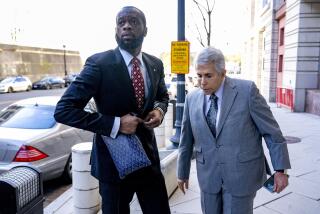TRW Missile Suit Dismissed
- Share via
A lawsuit by a longtime critic of the nation’s controversial antimissile defense system was dismissed Monday in U.S. District Court in Los Angeles after government attorneys argued that the case could jeopardize national security.
The 7-year-old suit, brought by former TRW Inc. senior engineer Nira Schwartz, alleged that the defense contractor falsified 1996 test results to show that its missile-detection software worked even though it was incapable of differentiating incoming enemy warheads from decoys or airborne debris.
Although a subsequent FBI investigation found that TRW had not tried to defraud the government, critics of the government’s missile defense system have held out Schwartz’s allegations as evidence that the program doesn’t work and that its backers -- including the Bush administration -- are trying to ram it through for political and economic reasons. (The Times reported Monday that the Bush administration is seeking to exempt the antimissile defense system from federal law requiring operational testing of new weapons systems before they are deployed.)
Last year the General Accounting Office said that TRW had exaggerated the test results. And last month, the Pentagon’s director of operational testing said the ground-launched missile interceptor system developed by TRW rival Raytheon Corp., which was selected by the Pentagon as the centerpiece of an antimissile defense system, has not been proven capable of discerning between real missiles and decoys.
Missile defense system critics, including physicist Theodore Postol of MIT, have said that Schwartz’s case is relevant today because Raytheon’s system uses the same type of recognition technology as TRW’s. Schwartz and Postol have claimed that the technology does not work because it cannot collect enough independent pieces of data to make valid decisions in identifying incoming missiles.
“The whole thing is a travesty,” Stephen Young, a senior analyst with the Union of Concerned Scientists, said of the case dismissal. The Washington-based lobbying group has long been a critic of the missile defense system and has worked with Schwartz on her suit.
Government attorneys, who argued that documents requested by the chief defendant in the case could jeopardize national security, declined to comment Monday.
Schwartz said she would appeal the court ruling.
“They say it will endanger national security, but I say that if this doesn’t go to trial the national security will be in danger,” Schwartz said in an interview.
“We need another technology but there is no way the president can see that if he is shielded by so many lies.”
Monday’s ruling came despite pleas from Sen. Charles E. Grassley (R-Iowa) and Rep. Howard L. Berman (D-Van Nuys) that Schwartz’s case be allowed to go to trial.
The two said in a letter to Atty. Gen. John Ashcroft that a trial would not reveal military secrets.
Schwartz’s attorney, Joseph Barrera, called Monday’s decision part of “a cover-up.” The government “did this with TRW to cover up their own problems,” the Los Angeles lawyer said.
Schwartz was suing under the False Claims Act, which allows private citizens to seek refunds and damages on behalf of the government from companies that obtain government business. Barrera said that companion whistle-blower and wrongful-termination suits, alleging Schwartz was punished by TRW for complaining to authorities about improper conduct by her employer, are pending in federal court.
A spokeswoman for TRW, which was subsequently acquired by Northrop Grumman Corp., said that company was “gratified” that the false-claims case had been dismissed. “TRW always maintained the case is without merit, but agreed with the government’s position that it could not be tried without the use of classified information,” she said.
It was TRW’s successful request in November for a court order compelling the government to produce documents it said were classified that prompted Monday’s hearing.
The law in false-claims cases allows the government to become a party to the suit at any point.
Federal officials declined in 1996 to side with Schwartz against TRW, leaving her to pursue the suit on her own. But opinions shifted after the November ruling, and in January the government asked to be allowed to enter the case -- effectively supplanting Schwartz as the plaintiff -- and to seek dismissal on grounds that the case threatened national security.
More to Read
Inside the business of entertainment
The Wide Shot brings you news, analysis and insights on everything from streaming wars to production — and what it all means for the future.
You may occasionally receive promotional content from the Los Angeles Times.










